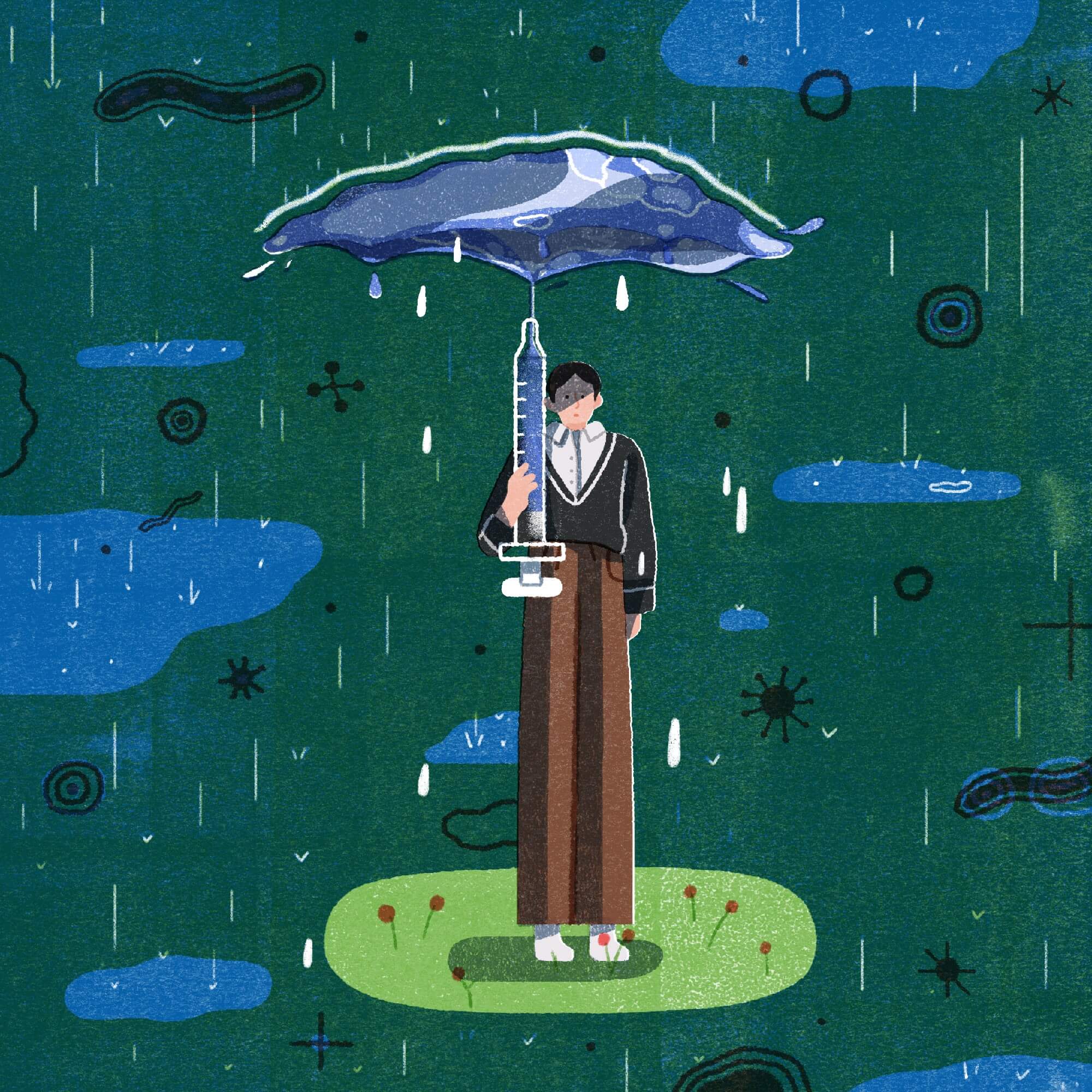Earlier this year, a team of researchers based primarily at Johns Hopkins University examined county-level health data collected from all 50 states and the District of Columbia. The team was looking for associations between last season’s flu vaccine and deaths attributed to Covid-19.
After adjusting for more than a dozen variables that could have confused their findings — such as race, income, education level, health status, and access to hospital care — the researchers concluded that among adults age 65 and older, a group that accounts for the vast majority of coronavirus-related deaths, high rates of vaccine coverage were associated with a significant drop in Covid-19 deaths. Each 10% increase in flu vaccine coverage within a community corresponded with a 28% reduction in coronavirus deaths, they found.
“Our findings suggest that influenza vaccination can possibly play a protective role in preventing the worst Covid-19 outcomes,” says Luigi Marchionni, co-author of the paper and an associate professor at Johns Hopkins Medicine.
In his team’s paper, which was posted online June 26 and has not yet undergone peer review or formal publication, Marchionni and his colleagues were quick to highlight their study’s limitations — which included a lack of Covid-19 reporting consistency among states and localities. But he says that he and his group have since performed additional analyses on the data, and their conclusions have held up. He also references a similar study from Brazil, which found evidence that people vaccinated against the flu were less likely than the unvaccinated to suffer from severe or deadly cases of Covid-19.
“We’re most likely going to face a dual pandemic this fall,” he says, referring to the ongoing SARS-CoV-2 crises and the predictable resurgence of seasonal influenza. “Our findings point to some obvious reasons for getting the influenza vaccination.”
What If Covid-19 and Flu Both Flare Up This Fall?
The second wave of Covid-19 could be worse, and there’s potential for a double whammy
elemental.medium.com
How the flu vaccine could provide an immune boost
Marchionni takes pains to explain that his team’s work was observational, meaning they were examining population-level data in an effort to find patterns and associations. They were not assessing individual Covid-19 patients in order to identify underlying explanations for their findings.
But after delivering that caveat, he says that there’s some evidence that the flu vaccine may trigger one or more immune system changes that may repel the novel coronavirus.
“There is an epitope, meaning a piece of antigen that the immune system can recognize, that is similar between influenza and SARS-CoV-2,” he says. It’s possible that the flu vaccine could teach the immune system to be on guard for this antigen, which could provide a coronavirus-blocking benefit.
He also says that the flu vaccine could induce a general “boost” to the immune system’s innate defenses, which could help it repel SARS-CoV-2.
If vaccinated people are generally healthier, then that alone could explain the association between the flu shot and lower rates of Covid-19 deaths.
There are other possible explanations for the observed association between flu vaccine coverage and reduced Covid-19 risk. During the spring, a number of reports documented cases in which people were infected with both the flu and SARS-CoV-2 at the same time. It’s not yet certain that coinfection with both viruses results in more extreme illness, but experts say that this is possible — and probably likely.
“Coinfection could absolutely make things worse,” says Steven Pergam, MD, an infectious disease specialist and associate professor at the Fred Hutchinson Cancer Research Center in Seattle. “If someone gets sick from the flu and their immune system is already on high alert and then they get Covid-19 on top of that, I worry that could shift them into a really severe Covid situation.”
This Year’s Flu Vaccine Could Be the Most Important One You Ever Get
You really don’t want to catch both the flu and Covid-19
elemental.medium.com
The flu vaccine can prevent influenza infections, Pergam explains, and it can also reduce the severity of illness among those who become infected with flu. Both of these benefits could theoretically reduce the risk of life-threatening illness among those also infected with SARS-CoV-2, he says.
It’s also possible that someone who contracts the flu and then recovers from it is at greater risk for a bad case of Covid-19 due to lingering immune system changes or deficiencies. T-cells are a category of specialized white blood cells that help regulate the immune system. Research has shown that, following a case of the flu, people have reduced T-cell diversity and also a greater proportion of influenza-specific T-cells in the lungs. If a person is infected with the novel coronavirus, these T-cell imbalances may lead to the “exaggerated inflammatory response” that is associated with severe Covid-19 disease, Marchionni says.
But others say there could be a simpler explanation for the observed associations between the flu shot and reduced Covid-19 risks.
“Patients who get the [flu] vaccine are also likely to be more health-conscious [than those who don’t],” points out Michael Ison, MD, a professor in the Division of Infectious Diseases at Northwestern University’s Feinberg School of Medicine. If vaccinated people are generally healthier, then that alone could explain the association between the flu shot and lower rates of Covid-19 deaths, he says.
Ison says that, for other reasons, it’s important for everyone to get the flu shot this year. But he’s not convinced that the influenza vaccine provides any special Covid-19-weakening immune benefits.
Other vaccines could offer an immune-system boost
The influenza vaccine isn’t the only one that researchers believe may offer some coronavirus-related benefits. Some are exploring the possibility that active but weakened polio or tuberculosis vaccines could stimulate the immune system in ways that protect people from SARS-CoV-2.
“When you vaccinate people with some of these live attenuated viral vaccines, the immune system produces a number of factors, such as interferons, which have a general antiviral effect,” says Paul Offit, MD, director of the Vaccine Education Center at Children’s Hospital of Philadelphia.
Inside the Making of the Flu Vaccine
An in-depth look at the CDC process. (It’s basically a high-stakes game of biological matchmaking.)
elemental.medium.com
Offit says that the National Institutes of Health is exploring the potential benefits of these vaccines, which could theoretically be deployed cheaply and widely among at-risk groups in an effort to block the spread of SARS-CoV-2. “Some people are pushing for this, but it’s not clear yet whether that will move forward,” he adds.
“When you vaccinate people with some of these live attenuated viral vaccines, the immune system produces a number of factors, such as interferons, which have a general anti-viral effect.”
The importance of getting the flu vaccine
While experts say that the coronavirus-weakening power of the flu vaccine is far from proven, they unanimously agree that everyone should get a flu shot this fall.
“Every year, the recommendation for the influenza vaccine is for everyone over six months of age to get it, and it’s more important to get it this year than normal,” says Offit.
Why? During the 2018–19 flu season, the Centers for Disease Control and Prevention estimates that roughly 36 million Americans came down with the flu, which led to more than 16 million health care visits or consultations and 500,000 hospitalizations. “If all this happens concurrently with Covid-19, you can see how that would quickly overwhelm the health care system,” Offit says.
Northwestern’s Ison reiterates these concerns and says that they underscore the need for people to get the flu shot, which is already available at many nationwide pharmacies. “I think that most individuals should go ahead and get the vaccine as early as possible,” he says. Those who are immunocompromised may want to wait until October, he adds, because their body’s protective immune response to the vaccine may not last until the end of the flu season.
Apart from the flu shot, he says that Covid-19-related safety measures like social distancing and masks can also protect people from seasonal respiratory infections like influenza. Good compliance with these protocols has led to an unusually mild flu season in countries like Australia, where the flu tends to circulate earlier in the year than it does in the U.S. But, due in part to poor adherence to these safety measures, Ison says that the U.S. “hasn’t done a good job of controlling Covid-19,” and so may be in for a rough flu season.
“Flu vaccination this year is going to be very important,” he adds.
Written by
Markham Heid


